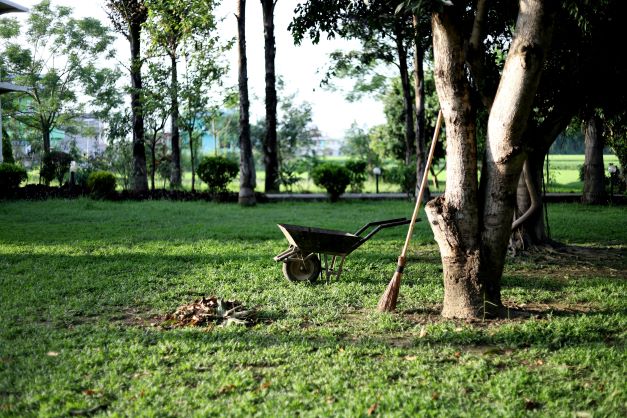Fall doesn’t lie. It reveals. Fall is like taking off make-up after a girl’s night out.
The annuals are leggy and weird, and each basil leaf is pimpled with bug bites. The exhausted tomatoes gave up weeks ago. The early-blooming cherry waits for the rest of the trees to shed their leaves, now burnt with sun. Then all the naked trunks will shiver together, and we’ll spend November raking up after them.
These things we expect in fall. They happen every year. But grass? Isn’t it perennial? Remember the line from the poem Desiderata, so popular in the 1960s and 1970s? I had a poster and memorized it:
“Neither be cynical about love // for in the face of all aridity and disenchantment it is perennial as the grass.”
Was poet Max Ehrmann paying love a compliment — or not? From my experience with grass, I’m not sure.
By October, in our yard, which we pretty much ignore, what we call “grass” is actually a vast phyla of weeds. They pop up in spring, pretend to be grass all summer, and then check out early. That’s why the lawn looks forlorn and patchy now. The weeds are brown dead, belying the lie of our lawn.
My life garden feels similarly autumnal. Ambitious flowers have lost their petals. Tomato plants didn’t get enough sun to sustain fruit. Leaves falling everywhere. Illness and injury. Tests and diagnoses. The occasional funeral for a parent or friend.
These things are hardly unexpected. But love? Purpose? And hope? Must they deflower and die as well?
The psalmist laments the grass: “My heart is struck down like grass and has withered.” Psalm 102:4.
This year, the man who cuts our lawn advised us to overseed it.
Overseeding is the pain-staking process of dethatching old growth with a metal rake, then aerating the lawn using a machine that actually spikes the ground and brings up plugs of dirt. Only when the ground is raked, poked and bleeding, can new seed take root.
The hope is this: that with rain, compost and a little care — new grass will yet grow in fall. This fall! Unlike weeds, real grass endures the winter and rises in spring. The sight of tender grass pushing up through dirt is a hopeful sign.
A few months ago, it hurt to walk. As I lay on my side, an orthopedist pumped cortisone into my IT band. To keep my mind off the size of the needle and interminable length of time it took to inject it, he asked the perfunctory question: “So what do YOU do?”
I pinched my thumb so my hip wouldn’t hurt so much. “I am studying theology, doing a masters.”
“Why?” he asked. (The question I think he wanted to ask was, “Why, whatever for?” or “Why in the world…?”)
At last the shot was over, and I sat up. “To find answers to my existential questions,” I said, and looked hard at him. “All those questions we hold inside, you know.” (Or, are you are in denial?)
I think then he understood. Maybe. (I have twenty years on him.)
Hitting the books (at my age) is like overseeding a well-used lawn. Do I need this? No. It is hard? Yes. Will I even remember what I am learning? Hopefully the important stuff will stick, like this: “He makes me lie down in green pastures…He restores my soul.” Psalm 23:2-3.
I linger long over the Psalms because sadness and loss have aerated me, puncturing expectations with painful realism. In my fall lament, I am planting something new.
And, wonders of wonders, brave blades of grass are pushing up through dead leaves.
Photo by Nagesh Badu on Unsplash

